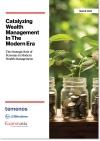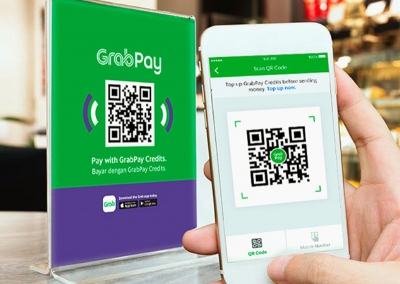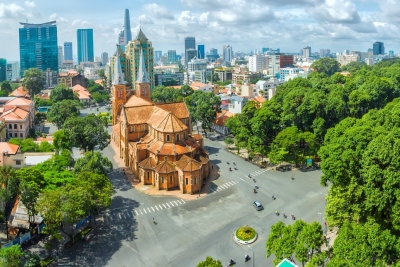Latest Insight
- Why cash is still prevalent in Asia
- Japan steps up green finance efforts
- South Korea charts middle path on crypto
- Should Grab and GoTo merge?
- Singapore pushes ahead with fintech-driven sustainability
- Digital banks in South Korea continue to thrive
- Billease is the rare profitable BNPL firm
- Fintech sector in Pakistan faces mounting challenges
- Where digital banks in Asia can make a difference
- Cashless payments jump in Vietnam
Latest Reports
-
Innovate to Elevate
 In the dynamic and diverse financial landscape of the Asia-Pacific (APAC) region, banks are at a pivotal juncture, facing the twin imperatives of innovation and resilience to meet evolving consumer expectations and navigate digital disruption. Catalyzing Wealth Management In The Modern Era
In the dynamic and diverse financial landscape of the Asia-Pacific (APAC) region, banks are at a pivotal juncture, facing the twin imperatives of innovation and resilience to meet evolving consumer expectations and navigate digital disruption. Catalyzing Wealth Management In The Modern Era Hyper-personalized wealth management presents a paradigm shift from traditional models relying on static, generalized segments. Developing tailored investor personas based on psychographics, behaviours and fluid financial goals enables financial institutions to deliver rich and tailored customer experiences that resonate with next-generation priorities. Navigating the Future of Fintech in Asia
Hyper-personalized wealth management presents a paradigm shift from traditional models relying on static, generalized segments. Developing tailored investor personas based on psychographics, behaviours and fluid financial goals enables financial institutions to deliver rich and tailored customer experiences that resonate with next-generation priorities. Navigating the Future of Fintech in Asia Although fintech has been a global phenomenon, nowhere has the combination of finance and technology been as impactful as in Asia. This report examines some of the key fintech trends that have been re-shaping Asia’s financial industry thusfar as well as examine the trends that will shape the future.
Although fintech has been a global phenomenon, nowhere has the combination of finance and technology been as impactful as in Asia. This report examines some of the key fintech trends that have been re-shaping Asia’s financial industry thusfar as well as examine the trends that will shape the future.
Events
| April 23, 2024 - April 25, 2024 Money 2020 Asia 2024 |
| October 21, 2024 - October 24, 2024 Sibos Beijing |
| November 06, 2024 - November 08, 2024 Singapore Fintech Festival |
Japan has been trying to digitize financial services for years, given the high costs of maintaining a cash-based economy and the need for convenient payment options during the upcoming Olympics. The government's"Cashless Vision" initiative that seeks to increase non-cash transactions to 40% by 2025 began back in 2018, well before the covid-induced cashless drive that's sweeping across Asia. Going cashless to promote hygiene would probably seem superfluous in Japan, a country already known for its exacting hygiene standards.
AMTD is stepping up efforts to build a regional fintech ecosystem in Southeast Asia and plans to take a controlling stake in Singapore's FOMO Pay, a payments solution provider. The FOMO Pay deal follows AMTD's recent acquisitions of the leading insurtech PolicyPal, and CapBridge, Singapore’s first regulated securities exchange for digital assets and private companies.
Southeast Asia's most valuable tech startup is coming down to earth at last, despite maintaining a sky-high valuation of more than US$14 billion. Faced with the pandemic-induced downturn, Singapore-based Grab is scaling back its ambitions and remarkably, cutting costs. That involves eliminating some superfluous business units and trimming about 5% of its workforce. Grab's professed goal is to rejig its operations to focus on three core businesses: ride-hailing, food delivery and digital banking. Its unstated goal is to get its finances in order so that its bid for a Singapore digital full back license is successful.
China's payments market is so big that U.S. credit-card giants reckon it's better to arrive late to the party than never. Although China's fintech giants Ant Group and Tencent control about 90% of the US$27 trillion payments market, the remaining 10%, at US$2.7 trillion, is not exactly chump change. Among the U.S.'s big three card companies, Amex is the first to have its clearing license approved for China. That first mover's advantage, coupled with cooperation with numerous local banks and payments firms, could give Amex an edge over Visa and Mastercard.
Australia launched its open banking regime on July 1, ushering in an era of increased competition and customer choice. The regime allows a customer of any of Australia's Big Four banks - National Australia Bank, Commonwealth Bank, Australia and New Zealand Banking Group and Westpac - to ask that their account and card data be sent to a third party accredited by the Australian Competition and Consumer Commission. In November, mortgages and personal loan data will be introduced, while smaller banks will join in 2021.
Cambodia's digital banking initiatives are increasingly on the money. The Kingdom has focused on fast-tracking digital banking to boost financial inclusion and develop the broader banking sector, which only serves a limited portion of the population. Just 22% of Cambodia's population of 16.2 million is banked. The good news is that fintech is bringing more Cambodians into the formal financial system. In 2019, active digital wallets in Cambodia jumped 64% to 5.22 million, according to a June report by the National Bank of Cambodia (NBC).
Taiwan's virtual banks were supposed to go live this summer but the coronavirus pandemic has delayed the launch date. The three neobanks, which include consortia led by Line Financial, Chunghwa Telecom and Japanese e-commerce giant Rakuten, will likely launch later in the year, according to Taiwan's Financial Supervisory Commission (FSC). The three neobanks have yet to start one-month operation simulation tests, a pilot period required by the FSC to ensure the banks are in shipshape.
By now it's a familiar story: COVID-19 is driving cashless payments adoption in Southeast Asia. As one of the region's key economies and recipients of fintech investment, Vietnam is a market to watch. What's notable about Vietnam is that it's better poised for an economic recovery than almost any other country because of how well it has controlled the coronavirus pandemic. While the rest of the world was in recession, Vietnam's economy grew 0.36% in the second quarter, beating a 0.9% contraction forecast by economists surveyed by Bloomberg.
The Singapore digital banking race is accelerating. The Monetary Authority of Singapaore (MAS) has winnowed down the applicant field from 21 to 14. While the MAS did not say which contenders failed to make the cut, observers close to the matter say that the consortia headed by Grab/Singtel, Sea, Razer and MatchMove have all advanced to the next round. Those four applicants are all bidding for a coveted digital full bank (DFB) license, which permits holders to serve both retail and non-retail customers. The MAS plans to issue a maximum of two DFB licenses.
Some things just weren't meant to be, like peer-to-peer lending in China. What began as a legitimate way to support financial inclusion through internet finance morphed into a scam-ridden zombie industry. Beijing has moved to shut down the majority of P2P lenders that haven't imploded on their own. The industry is going the way of crypto, another member of the fintech family that ran afoul of China's regulators. In a recent Sina Finance commentary, former Chongqing mayor Huang Qifan gave a scathing criticism of P2P lending, likening it to a digital version of traditional pyramid schemes he says have long existed in rural China.
More...
Ant Group, formerly Ant Financial, has big ambitions for Southeast Asia. By taking strategic stakes in ascendant fintech startups across the region, Ant hopes to gain a foothold in the region's most important economies and perhaps lay the foundation for a regional payments ecosystem. If Ant's bid for a Singapore digital wholesale bank license is successful, the Hangzhou-based company will be poised to serve SMEs in the city-state and could eventually expand to other key regional economies where the financial inclusion rate is lower.
Macau is the only place in China's territory where gambling is legal. Chinese regulators want all the gaming in one place where they can keep a watchful eye over it. That's why the regulators don't like online casinos. Those are much harder to monitor. Located offshore, primarily in Southeast Asia, they aren't subject to Chinese law, even though Beijing forbids its citizens from gambling online. For Chinese authorities, the primary concern is that Chinese people will use online casinos to circumvent China's strict capital controls, which limit overseas remittances to US$50,000 a year. In some cases, criminal activity is involved.
The pandemic-induced economic downturn could be a catalyst for needed financial reform in China, where foreign firms have struggled to gain market share. The Chinese economy contracted in the first quarter and will likely grow just 1.2% for the year, according to the IMF. A new UN report estimates that FDI could drop 40% this year, falling below US$1 trillion for the first time since 2005. At the same time, China's trade surplus is narrowing. Capital outflows are rising despite stringent controls, reaching US$50 billion in March and April, according to Nikkei Asian Review. Capital inflows from foreign investors in the financial sector could help stabilize the renminbi.
Hong Kong's virtual banks will not easily unseat entrenched incumbents, but the newcomers are already succeeding in one respect: They are forcing traditional banks to up their digital game. This trend started well before the coronavirus pandemic, but has accelerated as concerns about the virus impede customer visits to physical branches. The virus is acting as a catalyst for digital transformation among Hong Kong's incumbent banks just as the virtual banks are launching.
Southeast Asia's two most valuable tech startups are determined to reinvent themselves, transforming from ride-hailing giants into digital banks. Singapore's Grab is leading in every Southeast Asian market but one: Indonesia, which happens to be where its arch-rival Gojek is based. Having recently received investments from Facebook and PayPal, Gojek looks to have the edge in the region's largest economy. But Grab is determined to prevail there. That's why the Grab-backed digital wallet Ovo is reportedly planning to merge with Dana, which is backed by Chinese fintech giant Ant Financial. Together, Ovo and Dana might be able to give Gojek's fintech arm GoPay a run for its money.















